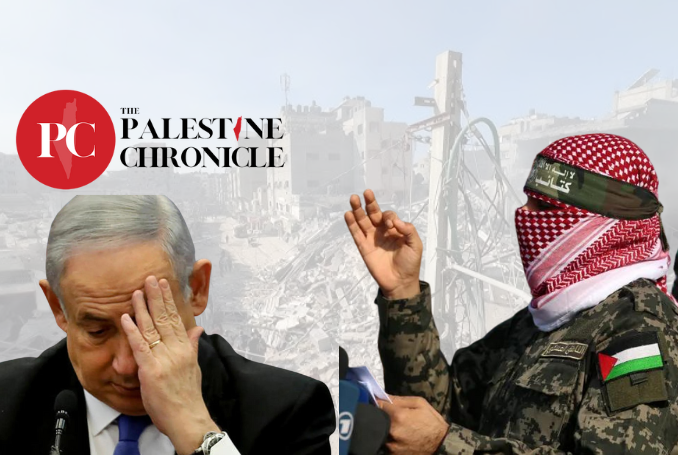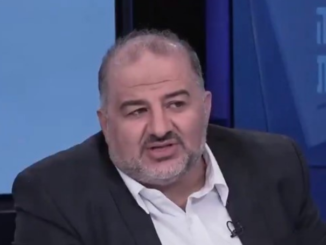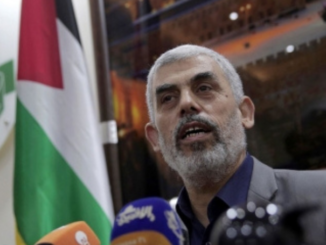
By Ramzy Baroud & Romana Rubeo
Hamas’ position has not changed. The same cannot be said about Israel. The Israeli position, whether political or military, is that of confusion and contradictions.
As soon as Al-Qassam Brigades, the military wing of the Palestinian Resistance Movement Hamas, learned that Israel had violated the conditions of the truce on Tuesday, November 28, as soon as it responded.
According to the Israeli army, Hamas has detonated three explosive devices, near Israeli soldiers in “different locations of northern Gaza”, wounding several.
Again, the message of Hamas is that the movement has not agreed to the truce from a position of weakness, and is willing to resume the fighting as soon as it is necessary to do so.
Hamas’ position has not changed. Indeed, it remains consistent with its positions from the start of the war: We are ready to exchange all of our captives, for all Palestinians held in Israel; We will fight until the last Israeli soldier leaves Gaza; and our ultimate aim is a political settlement, which includes ending the siege on the Strip, respecting holy sites in Jerusalem, and a political settlement that ends illegal Israeli colonization of the West Bank, and a fully independent Palestinian state.
The same cannot be said about Israel. The Israeli position, whether political or military, is that of confusion and contradictions. And also, tough talk.
This was on full display on Tuesday, November 28 in Gaza, when the Israeli War Cabinet Minister Benny Gantz visited south Israel.
“After the cease-fire, the war will resume,” he said, emphasizing that “the entire War Cabinet is united in this position. There is no other option.”
“We are preparing for the next stages of the war, and for expanding the maneuver in the Gaza Strip as a whole. It will not be a city of refuge for terrorists and Hamas leaders.”
Hamas understands that Gantz’s comments are intended mostly for local consumption. In fact, this is precisely how top Hamas official Osama Hamdan described Israel’s declaration that it was ready to resume the war.
For his part, Hamdan said that the Israeli army is yet to set foot on nearly 80 percent of the land of Gaza and that such a mission is impossible anyway.
The Hamas official based his statement on the fact that Israel has fought a total of 48 days of war, including 28 days of ground invasion, without advancing beyond empty areas in the north and east, and without seriously engaging with Palestinian fighters in the most populated areas in northern Gaza.
If Israel has any achievement worth mentioning, it is the fact that it has penetrated the main road, spilling north Gaza from the south. But even then, this operational military move remains indefensible. This is precisely why various Israeli units were forced to retreat or reposition themselves in the last hours before the first day of ceasefire, on November 24.
Then, there is the subject of Israeli casualties. Slowly, the Israeli military is releasing information about the number of soldiers killed and wounded in Gaza.
Today, for example, the Israeli newspaper Haaretz cited the Israeli army as saying that over 1,000 Israeli soldiers were wounded in the ground fighting in Gaza, out of which 202 are critically wounded.
The number has to be higher, and not just because of Al-Qassam’s documented evidence of hundreds of Israeli tanks and other military vehicles being hit or blown up.
On November 23, the Israeli Disabled Veterans Organization said that 1,600 Israeli soldiers have been permanently disabled as a result of the war, in addition to thousands more who are suffering from post traumatic stress disorder.
Permanent disability could only mean one out of three things: a serious injury, a debilitating injury, or both.
All this in mind, it is hard to fathom Israel’s enthusiasm to return to the battlefield with gusto, as promised by Gantz.
The battlefield is once again proving to be the ultimate test, according to which victory and defeat are being defined, on both sides of this deadly struggle.
While Palestinians know fully what they are fighting for, the Israelis seem to be motivated by revenge, which must have, to some extent, been satisfied, considering that they have killed well over 15,000 mostly innocent civilians. (The number will grow by several thousands due to the missing Palestinians under rubble.)
Moreover, military victories only count if they are joined by a political and strategic victory. Out of these three potential victories, Israel has, so far, achieved nil.
And this is why CIA Chief William Burns is currently in Doha, Qatar, to talk about a “more expansive deal”.
“Expansive deal” could only mean a comprehensive prisoner swap and ending the Israeli war on Gaza, simply because Hamas would not agree to releasing all Israelis held in Gaza without assurances that the war will be over.
But if that takes place, only one interpretation is possible: Palestinians have won, Israel has lost.
And this is why US Secretary of State, Antony Blinken, is planning yet another visit to the Middle East.
Unlike Burns, Blinken wants to talk politics, specifically how to manage the final chapter in the Israeli war to help Tel Aviv save face.
Sure, he will talk about what to do with Gaza once Hamas is defeated, but he should know that that scenario is no longer applicable, and that the chances of it taking place are as unlikely as Israel winning this war.
Only time will tell how Blinken and his friends in Washington and Tel Aviv will try to brand, or perhaps rebrand, the Israeli war on Gaza, to justify its failure to achieve any of its initially declared objectives.
For the Palestinian Resistance in the destroyed Gaza Strip, however, they feel that they are one step closer to clinching the first actual military victory over Israel in a so-called conflict that has extended for over 75 years.
Considering the reality on the ground at the moment, the Palestinian assessment seems to be fully justified.
– Dr. Ramzy Baroud is a journalist, author and the Editor of The Palestine Chronicle. He is the author of six books. His latest book, co-edited with Ilan Pappé, is ‘Our Vision for Liberation: Engaged Palestinian Leaders and Intellectuals Speak Out’. His other books include ‘My Father was a Freedom Fighter’ and ‘The Last Earth’. Baroud is a Non-resident Senior Research Fellow at the Center for Islam and Global Affairs (CIGA). His website is www.ramzybaroud.net
– Romana Rubeo is an Italian writer and the managing editor of The Palestine Chronicle. Her articles appeared in many online newspapers and academic journals. She holds a Master’s Degree in Foreign Languages and Literature and specializes in audio-visual and journalism translation.







